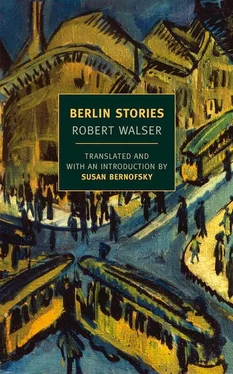1907
Up above is a narrow strip of sky, and the smooth, dark ground below looks as if it’s been polished by human destinies. The buildings to either side rise boldly, daintily, and fantastically into architectural heights. The air quivers and startles with worldly life. All the way up to the rooftops, and even above, advertisements float and hang. The large lettering is quite conspicuous. And always people are walking here. Never in all the time this street has existed has life stopped circulating here. This is the very heart, the ceaselessly respiring breast of metropolitan life. It is a place of deep inhalations and mighty exhalations, as if life itself felt disagreeably constricted by its own pace and course. Here is the wellspring, the brook, the stream, the river, and the sea of motion. Never do the movement and commotion here fully die out, and just as life is about to cease at the upper end of the street, it starts up again at the bottom. Work and pleasure, vices and wholesome drives, striving and idleness, nobility and malice, love and hate, ardent and scornful natures, the colorful and the simple, poverty and wealth all shimmer, glisten, dally, daydream, rush, and stumble here frenetically and yet also helplessly. A fetter unlike any other restrains and subdues passions here, and countless allurements lead straightaway to appealing temptations, such that failure’s sleeve cannot help but brush against the back of gratified desires and insatiability is inevitably left to gaze with smoldering eyes into the wise, peaceful eyes of a person who finds satiation within himself. There are gaping chasms here, and one sees the rule and reign — to the point of utter impropriety, which no thinking person should take amiss — of opposites, indescribable contradictions. Vehicles keep edging past human bodies, heads and hands, and on their open decks and in their hollow interiors sit people, tightly squeezed in and subjugated, who have some reason to be sitting, squeezing, pressing, and riding either here inside or up on top. Every last silly little thing has its unspeakably swift justification, its good clever grounds. Every foolishness here is ennobled and sanctified by the obvious difficulty of life. Every motion has its meaning, every sound here has practical cause, and from every smile, every gesture, every word a strangely charming staidness and respectability approvingly peeks out. Here one approves of everything, because every individual, compelled by the constraints of the hobbled traffic, has no choice but to approve without hesitation all he hears and sees. No one seems to have the desire to disapprove, the time to dislike, or the right to demur, for here — and this is what’s so marvelous — everyone feels obligated in a light, helpful way, tidily obligated as it were. Every beggar, rogue, monster, etc. counts here as a fellow human being and must, for the time being, amid the general press, push, and shove, be tolerated as part of the collectivity. Ah, this is the homeland of the wretched, the little man, no the littlest one, the one who has already been dishonored somewhere and somewhen; here, here tolerance reigns, as no one wishes to spend and waste his time on impatience and displeasure. This is the place of peaceful walks embarked on in the sunshine as if upon a remote, silent mountain meadow, and when the lamplight is shimmering you stroll elegantly about as in a fairy tale filled with magical arts and spells. It’s wonderful how ceaseless and incessant the twofold stream of people on the sidewalks is, like a viscous, shimmering, profoundly meaningful body of water, and how splendid it is the way torments are overcome here, wounds concealed, dreams fettered, carnal appetites reined in, joys suppressed, and desires chastened, since all are compelled to be considerate, considerate, and once more lovingly and respectfully considerate. Where a human being finds himself in such proximity to human beings, the concept neighbor takes on a genuinely practical, comprehensible, and swiftly grasped meaning, and no one should have the gall to laugh too loudly, devote himself too assiduously to his personal difficulties or insist on concluding business matters too hastily, and yet: what a ravishing, beguiling haste can be seen in all this ostensible packed-in-ness and sober-mindedness. The sun shines here upon countless heads in a single hour, the rain dampens and drenches a ground that is anointed, as it were, with comedies and tragedies, and in the evening, ah, when it begins to grow dark and the lamps are lit, a curtain slowly rises to reveal a play that is always sumptuously full of the same habits, acts of lechery, and occurrences. The siren Pleasure then begins to sing her divinely enticing, heavenly notes, and souls burst asunder amid all these vibrating wants and dissatisfactions, and a disgorging of money then commences that baffles the modest, clever understanding and can scarcely be envisioned, even with effort, by the poetic imagination. A bodily dream rising and falling with voluptuous breath then descends upon the street, and everything races, races, races with uncertain step in pursuit of this all-encompassing dream.
1907
A weekly market is something bright, lively, sumptuous, and gay. Through the broad streets that are usually so still stretch two long rows of stands, interrupted by gaps, where lies and hangs everything that households and families require for their daily needs. The sun that in these parts can usually lie about haughtily and idly is now compelled to leap and glint, to flail about, as it were, for every mobile thing here present, every object, every hat, apron, pot, sausage, absolutely everything wants to be given a sparkle. Sausages bathed in sunshine look so splendid. The meat shows off in all its glory, proud and purple, on the hooks from which it hangs. Vegetables are greening and laughing, oranges jesting in stunning golden profusion, fish swimming about in wide tubs of water. You stand like this, and then you take a step. You take … It’s not so terribly important whether the planned, ventured, and executed step is indeed an actual one. This joyful, simple life — how unpretentiously attractive it is, with what middle-class domesticity it laughs at you. And then the sky with its top-notch, first-rate blue. First-rate! One wouldn’t want to go so far as to employ the word “sweet.” Where poesy can be felt, poetic flights are superfluous. “Three urnges fur a grosch’n.” So tell me, mister, could it be you’ve uttered these words once before? What a selection of splendid, plump women! Coarse human figures make us think of the soil, of country weals and country woes, of God himself, who surely doesn’t have so exaggeratedly handsome a physique either. God is the opposite of Rodin. How enchanting this is: being permitted to take a bit of pleasure in something rustic, even only a grosch’n’s worth. Fresh eggs, country ham, country and city liverwurst! I have to admit: I do like standing and scallywagging about in the proximity of tempting comestibles. Again I am reminded of the most vivid ephemeralities, and what is alive is dearer to me than the immortal. Flowers here, crockery over there, and right beside it cheese: Swiss, Tilsiter, Dutch, Harzer, with the accompanying odors. If you gaze off now into the distance, hundreds of subjects for landscape paintings come into view; if you look down, you discern apple peels and nut shells, scraps of meat, bits of paper, half and whole international newspapers, a trouser button, a garter. If you look straight up, there’s a sky, and if you glance right in front of you, the face of an average person — though we don’t speak of average days and nights or an average nature. But isn’t the average actually what is solidest and best? I have no use for days or weeks of genius, or an extraordinary Lord God. What is mobile is always the most just. — And how prettily farmwives can look at you. With what odd, quiet gestures they turn this way and that. The market always leaves behind an inkling of country life in this city neighborhood, as if to shake it out of its monotonous pride. How lovely it is that all these wares are lying out in the fresh open air. Boys buy themselves warm sausages and have mustard spread up and down their entire juicy lengths so as to devour them skillfully on the spot. Eating seems so appropriate beneath this lofty blue sky. How enchanting these voluptuous bunches of cauliflower look to me. I shall compare them (somewhat reluctantly) to firm female breasts. The comparison is impertinent if it doesn’t work. So many women all around one. But the market, I see, is now coming to an end. Time to pack up shop. Fruit is raked into baskets. Kippers and sprats are stowed away, stalls dismantled. The throng has moved on. Soon the street will have recaptured its former appearance. Adieu, colors. Adieu, all you various things. Adieu, you sprinkling of sounds, scents, motions, footsteps, and lights. By the way, I’ve struck a bargain for a pound of walnuts. So now I can go trotting home to my apartment full of wee-wee and waa-waa, children’s cries. I like to eat just about everything, but when I eat nuts I’m truly happy.
Читать дальше












